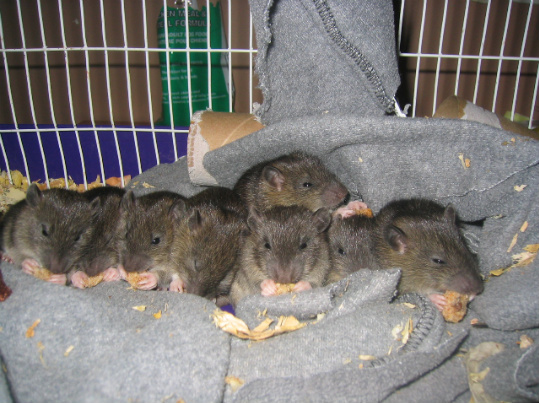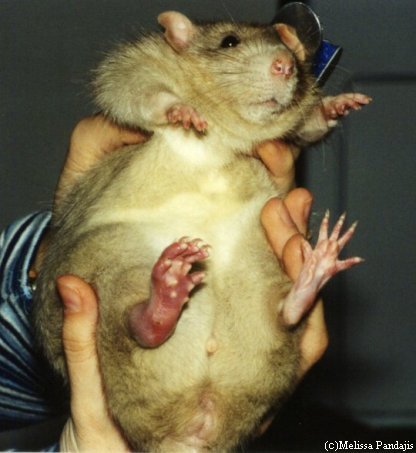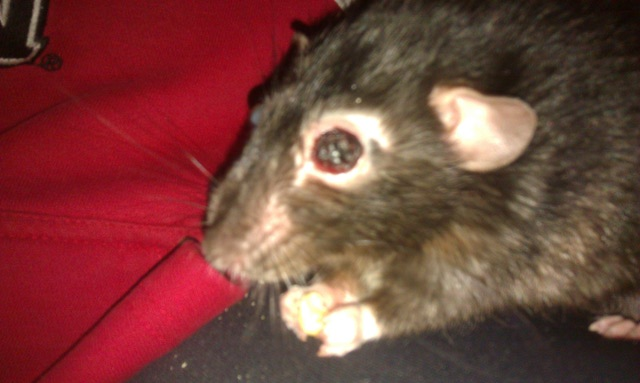QuestionHello Sandra,
We just purchased two fancy rats from one of my ten year old son's friends who had had the rats for about 6 months. When we got the rats they appeared to be healthy and then about 25 days after we got them, one of them began showing symptoms, becomming lethargic, sneezing and developed a brown fluid around the eyes. We took it to the vet who diagnosed an upper respiratory infection and gave it an antibiotic. We pampered it for about a day and a half until it succumed and passed away. My question is, how could it have caught a respiratory infection as we don't have any other rats? The other one seems healthy but does have a slight sneeze. What did we do wrong? My son is devestated and doesn't know what to say to the little boy who had them first.
Thanks,
John B.
AnswerHi John
I am really sorry for your loss :(
Unfortunately, the rat had a weakened immune system when you brought him which makes rats more susceptible to certain diseases, and a respiratory infection caused by the mycoplasma organism is usually the culprit.
Its pretty in depth so I will tell you the basics before sending you over to my website and to the web page all about myco.
Mycoplasma, which is a bacteria that lacks a cell wall, comes in many forms, effecting many mammals, including humans. However each form of myco is species specific, so what may make a man sick is non pathogenic to the rat and vice versa.
Mycoplasma pulmonis: This is the bacteria that lives in a state of commensalismm which means it is non pathogenic to the rat and is a normal flora until the immune system is in a weakened state. Once this occurs, the bacteria becomes pathogenic to the rat and causes infection of, but not limited to the respiratory tract in the rodent. Myco can also cause urinary tract infections, inner ear infection and uterine infections in intact female rats.
How do they get it? They get it from mom, as it is passed to the baby rat is it travels through the birth canal.
Bottom line is, all rats CAN get it, even if the live alone.
However, outbreaks can be prevented , although its not carved in stone that even following strict guidelines (which are on my website) will keep your rat from ever contracting any of the illnesses myco is responsible for. If the rat is not bred well for health by a good breeder, for starters, is a good indicator your rat MAY end up sickly and wide open for health problems related to myco. Keeping the rats respiratory tract healthy is one way to prevent it by avoiding certain litters/bedding and also protecting their respiratory tract from irritants such as a build up of ammonia in their cage from their litter being so dirty from urine, avoiding cigarette smoke and lit candles or any perfumes, air sprays, powders etc...
healthy diet is important as well and a big well ventilated cage with out overcrowding by having too many rats in it is also important.
The biggest thing is treatment and how fast you get the rat to the vet and if the vet knows what he or she is dealing with. There are a handful of antibiotics that can work on an organism that lacks a cell wall since most antibiotics are made to fight the cell wall. Baytril is one of the few drugs that work to kill myco. The next step is that the vet needs to understand that relapse is one way for the rat to end up with scarred or blistering lungs and also pneumonia and sometimes it can become chronic like a person that has emphysema or serious asthma that is hard to control. All of this can also be prevented by the vet keeping the rat on the correct medication for the proper length of time, which is usually 30 days and now some top experts are saying up to 6 weeks!
Anyhow, you can learn more on my website about myco, which in my opinion, is something every rat owner should know all about like the back of their hand. Most vets that are non certified exotic vets but yet still see exotics may only know the basics of myco, which in the long run can cause the rat to end up having chronic problems with his lungs and thus in turn, dies prematurely usually from myco related pneumoniaddddddddddddddddddddddddddddddddddddddd or a secondary infection from an immune system that was weak from fighting off myco for so long.
here is the URL to my website to read more about it so you can understand the ways to prevent it as far as cage set up, the best litter to use etc...and my page on proper diet also so you can be sure the rat is getting the best possible diet ever. High protein and high fat can also cause serious health problems in rats esp kidney disease.
We fall in love with these critters that have been given a bad rap for centuries and although they have a short life span of 4 years or less, with the right care they can live to be 3 to 4 years and when they have alot of health problems they usually dont make it past 2 years old, which is why I am here along with other people, trying to educate the rat owner on how to provide the best care possible to make our little five dollar rat live the best life a rat can live!
The URL to my site and the page on mycoplasmosis:
http://www.freewebs.com/crittercity/mycoplasmosispage.htm
Hope this helps!

 mouse
QuestionQUESTION: Hi Sandra,
I saw some of your questio
mouse
QuestionQUESTION: Hi Sandra,
I saw some of your questio
 joint infection
QuestionQUESTION: Hi, I wrote to you a few days ago abo
joint infection
QuestionQUESTION: Hi, I wrote to you a few days ago abo
 Jenkins eye infection... continued
Question
Jenkins Jenkins
His eye almost lo
Jenkins eye infection... continued
Question
Jenkins Jenkins
His eye almost lo
 Bio-catolet
QuestionQUESTION: Hi Sandra
I was just wondering if Bio
Bio-catolet
QuestionQUESTION: Hi Sandra
I was just wondering if Bio
 Re prev post weird twitching before xmas
QuestionQUESTION: Unfortunately Soupy passed away as i
Re prev post weird twitching before xmas
QuestionQUESTION: Unfortunately Soupy passed away as i